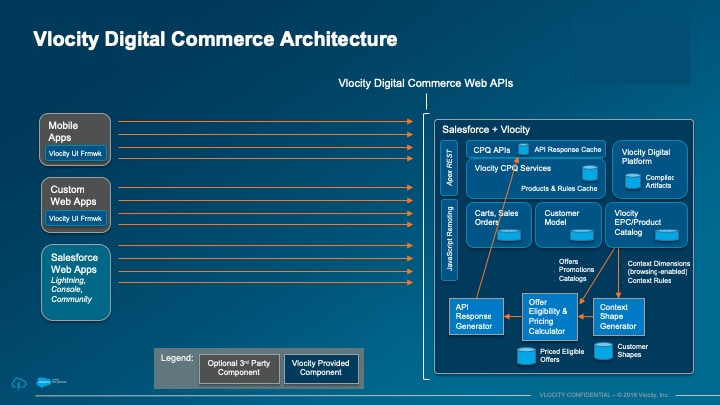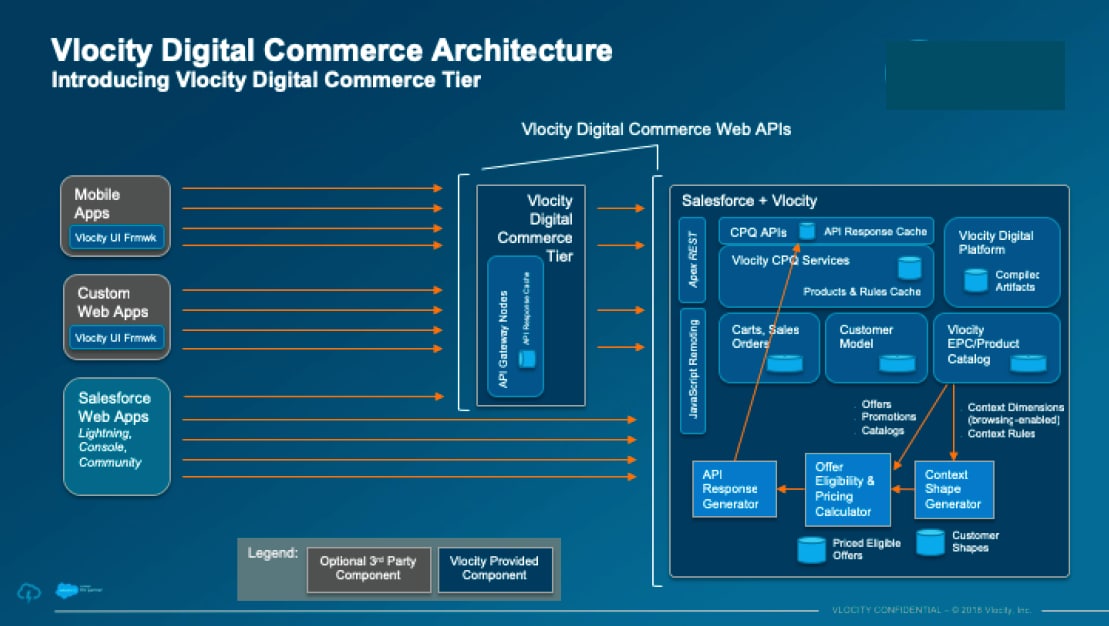Digital Commerce API Caching
The Digital Commerce APIs are RESTful Web APIs that are designed to enable client applications such as consumer-facing web and mobile apps to shop for products and services. Digital Commerce API caching is optimized for consumer shopping use cases where the user is often anonymous until well into the check-out process.
The APIs are also optimized to enable caching of API responses to provide additional performance and scalability. In addition, the APIs are optimized for lower bandwidth connections between the client application and the server by minimizing the metadata returned in the response.
When Digital Commerce API calls are made, the API response cache is checked before processing the request. If a response to a request is in the cache, the response is returned to the client without further processing. If the specific request is not in the cache (a cache miss), the API will run Industries CPQ services to calculate the response, return the response to the user, and store the response in the cache for future use.
Digital Commerce API Caching provides cache administration controls to populate and delete the cache using Vlocity CMT Administration pages. See Cache Management.
A catalog (or multiple catalogs) is required for shopping and browsing.
Digital Commerce API caching uses the Vlocity Context Rules Framework. The product administrator defines context dimensions and rules which determine all permutations of a customer shape. Context rules are evaluated for each product and cached against these permutations in an object inside Salesforce.
The Vlocity Omnichannel REST APIs simplify client application development by hiding the details of internal CPQ processing. Client-side developers do not need to understand details of the underlying CPQ logic; there is no need to know the proper order to apply eligibility and availability rules, and no need to learn the methods of the underlying CPQ rules engines and other CPQ services.
The Vlocity Communications API Caching suite of Configure Price Quote (CPQ) Services is based on modern, enterprise-scale Omnichannel Web application programming interfaces (APIs). The web APIs are designed for use by web and mobile developers to extend Vlocity Industry Cloud Application functionality to other applications, devices, and channels.
Vlocity Omnichannel Web APIs include a comprehensive set of CPQ-specific Web APIs that you use to develop a variety of powerful CPQ services for your applications. The APIs provide a layer of abstraction between client application developers and developers who configure and customize the underlying CPQ logic.
You can call a CPQ API as a REST API resource using a Uniform Resource Identifier (URI).
In OmniScript, you can call the CPQAppHandler and methods directly. OmniOut calls the CPQAppHandler through a “GenericInvoke” class.
Use a utility such as Postman to try out the APIs.
You can use Digital Commerce API Caching to develop the following types of services:
-
Product Selection (see Get Offers by Catalog API and Get Offer Details API)
-
Product Configuration (see Update Basket Contents API, Create Cart from Basket)
To begin using the Digital Commerce APIs, start by configuring API custom settings detailed in the CPQ Configuration Settings Reference.
Product and pricing metadata stored in the Product Catalog provide the seed data to the engine, which creates priced offers that are cached inside Salesforce. The cached API responses are then available when new calls are made.

Salesforce consistently provides best-in-class performance and scalability. Very large communications, media, and energy companies might require additional scalability for peak traffic events, such as iPhone roll-out or pay-per-view specials.
The Digital Commerce API Caching Tier is an elastically scalable commerce engine that will offload CPQ processing from the Salesforce platform. In the initial release of the Vlocity Communications API Caching Tier, the functionality is limited to an API gateway and a cache store. The architecture of our API caching solution is platform-agnostic. However, the Digital Commerce API Caching Tier is initially certified and operated on Amazon Web Services (AWS) and managed by Salesforce.
The Digital Commerce API Caching Tier is an optional component of the architecture that enables customers to store the cached API responses outside of Salesforce.

Using off-platform caching moves the cache from the Salesforce platform to a scalable off-platform cache. Off-platform caching is useful if you experience high-volume traffic at certain peak times, or if your network traffic is always high-volume.